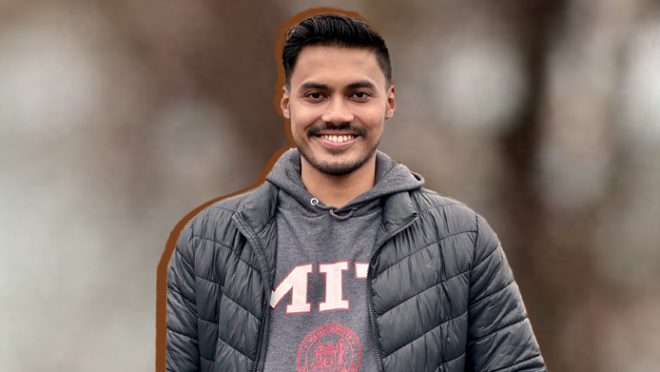From Bangladesh Army to pursuing a PhD at MIT: Akib Zaman's journey towards robotics
From Bangladesh Army to pursuing a PhD at MIT: Akib Zaman's journey towards robotics

Akib Zaman’s story is quite unconventional. Once an army officer, Akib is now a PhD candidate at the Massachusetts Institute of Technology (MIT) in the Department of Electrical Engineering and Computer Science (EECS). He is part of MIT’s renowned Computer Science and Artificial Intelligence Laboratory (CSAIL), working on shape-shifting robots—innovations that sound straight out of Transformers or Terminator.
Living in Cambridge, Massachusetts, Akib recently shared his extraordinary journey with The Business Standard in a virtual interview.
Akib grew up in Jashore and studied at Jhenaidah Cadet College before joining the Bangladesh Military Academy (BMA). While at BMA, he was selected for the Royal Military Academy Sandhurst in the UK—one of the world’s finest military training institutions—and graduated with the Best Overseas Student award.
After graduating from Sandhurst, Akib returned to Bangladesh as a Second Lieutenant but soon realised his true passion lay in innovation and research. He continued his bachelors at the Military Institute of Science and Technology (MIST), where he graduated with a CGPA of 3.98 in Computer Science.
When asked what he wanted to be as a child, Akib briefly pauses and ponders. “I never actually wanted to be an army officer,” Akib confessed with a laugh. “At cadet college, I developed an interest in engineering and even considered genetics, but my path eventually led me to robotics.”
Curious about his time at Sandhurst, I asked him to share his experience there.
“I joined Sandhurst back in August, 2016 where I made two major discoveries. First, I realised how small my world had been until then. Sandhurst exposed me to diversity which, I believe, is important to broaden one’s horizon. And second, confidence—I learned to trust my abilities.”
During his Sandhurst days, Akib visited 15 European countries. The academy housed 36 overseas cadets from 18 different countries, including Jordan’s Crown Prince Hussein, who graduated alongside him. Among the 36 cadets, Akib emerged as the Best Overseas Student.
When asked about his current research at MIT, Akib explained, “Initially, my work explored the intersection of robotics and geometry processing. Now, I am focused on developing algorithms to optimise the design and control of shape-shifting robots. Imagine the microbots from Big Hero 6—tiny robots capable of incredible feats, controlled by a central intelligence system. My research tackles problems like selecting the optimal design from a vast search space and developing a robust central intelligence system to maneuver these robots effectively. Solving these challenges requires a deep understanding of geometry processing.”
Akib is also venturing into the use of phase-changing materials to create jelly-like shape-shifting robots. “Picture a soft robot that can split its body to navigate narrow arteries and locate cholesterol blockages,” he explained. “This technology has immense potential for exploring uncharted environments, whether in space, the deep ocean, or within the human body. Identifying the right type of material is another critical aspect of the work, and we’re actively researching it.”
After graduating from the Military Institute of Science and Technology (MIST) in 2021, Akib joined United International University (UIU) as a lecturer. There, he began assembling a solid research portfolio, collaborating with professors at Rutgers University and UIU on projects such as a deep-learning framework for sleep-stage classification. These efforts played a pivotal role in securing his acceptance into MIT’s PhD programme.
When asked about how he prepared himself for the top school in the world, Akib shared, “I didn’t apply immediately after graduation because I felt my profile wasn’t strong enough. Instead, I spent two years building my research credentials, publishing papers, and networking with professors whose interests aligned with mine.”
One of Akib’s standout undergraduate accomplishments was leading the development of UVC-Purge, a semi-autonomous robot designed to disinfect spaces during the Covid-19 pandemic. This project deepened his interest in robotics and later propelled his team to participate in NASA’s University Rover Challenge. Their rover, Mongol Barota, earned the top global score which proved his passion for innovative problem-solving.
In September 2022, Akib began identifying professors and labs that aligned with his research goals. “I targeted top and mid-tier US universities based on the QS World University Rankings,” he said. “Eventually, I received offers related to robotics from several institutions, including MIT.”
Akib emphasised three key factors that contributed to his success: academic performance, research experience, and extracurricular activities (ECAs).
“My CGPA was 3.98 out of 4, which demonstrated consistent dedication. And speaking of GRE
“MIT waived the GRE requirement for my application year, and many top schools don’t even require it anymore. However, I took the IELTS and scored a Band 8, with all sections above 7.5. I’d say this is important. Also, ECAs help to round out your application. My ECA profile included teaching at UIU and engaging in innovative projects at MIST. These experiences helped.”
When asked about his plans post-PhD, Akib remained undecided. “I value intellectual satisfaction above all else,” he said, pondering whether to pursue academia, industry, or even establish his own start-up. However, one thing is clear: his work will prioritise humanitarian applications over military usage.
“I want to contribute to developing effective AI solutions in Bangladesh,” he said, expressing his interest in working on unmanned aerial vehicles (UAVs).
Akib is a big movie fan. I asked if he could have one of his favourite movie characters join his robotics team, who would it be? He thought for a moment. “I think I’d go for Optimus Prime from Transformers. And, oh, the character ‘Happiness’ from Inside Out—the one inside Riley’s head. During the tough times of a PhD, a bit of support from Happiness wouldn’t hurt!”
For aspiring students, Akib had two things to share: one, keep your curiosity alive and two, whatever opportunity you get, grab it with both hands.
Beyond his academic and professional pursuits, Akib loves football, cheers for Real Madrid and is a crazy Brazil fan.


